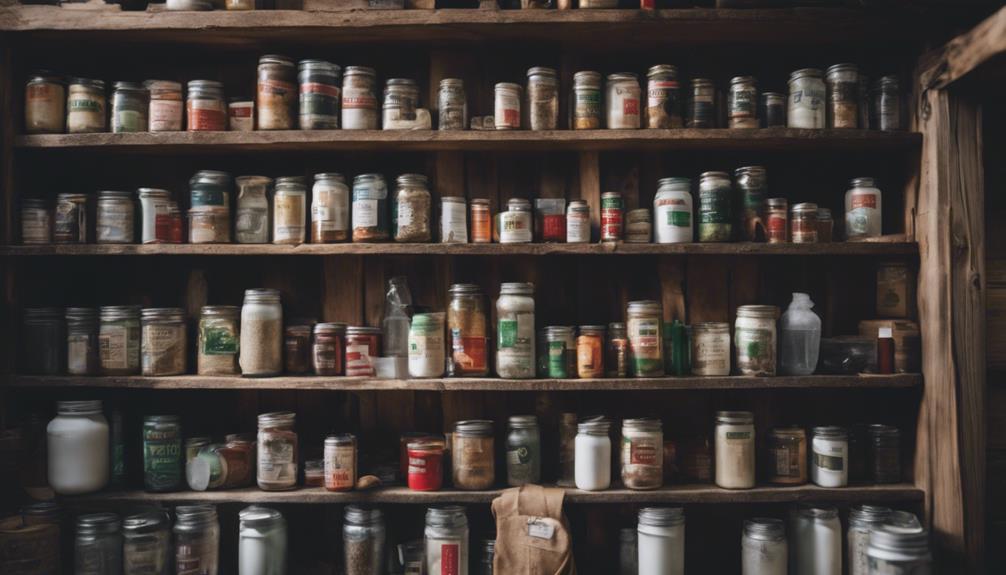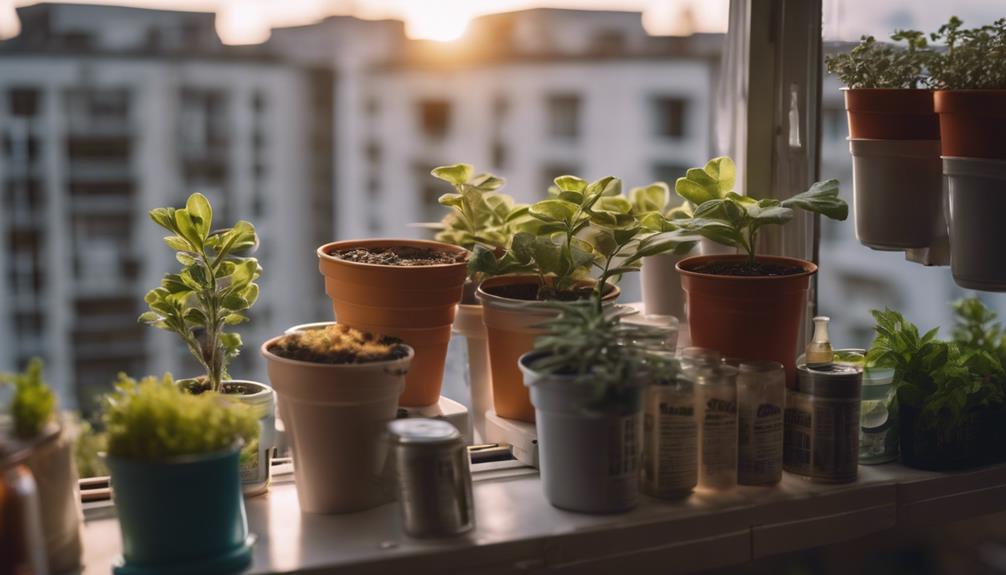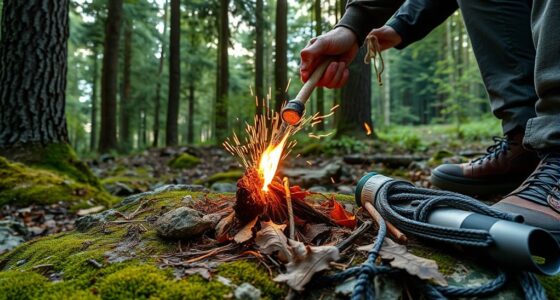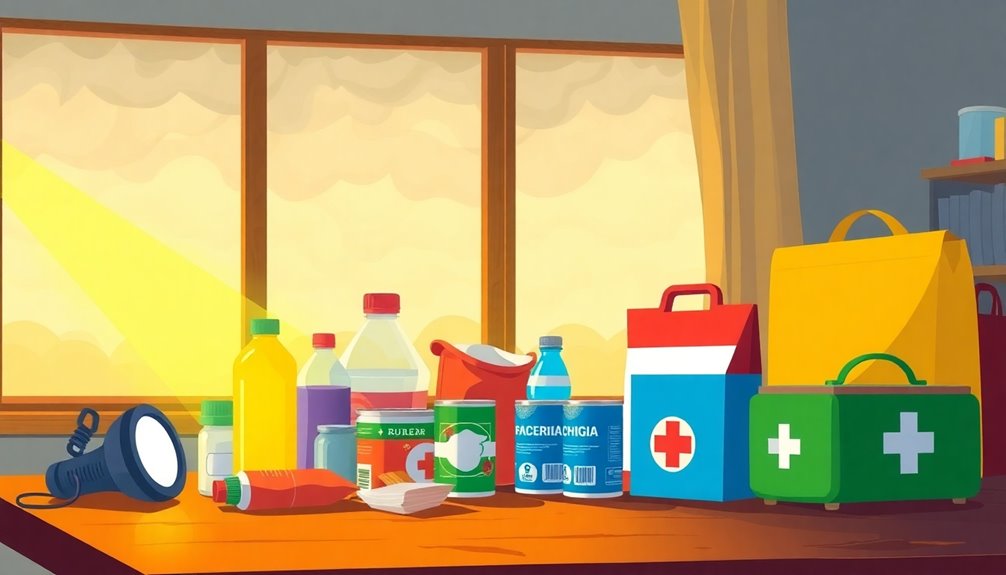Prepare for any scenario with the ultimate preppers survival guide. Learn essential skills like shelter building, fire starting, and water purification. Create a customized emergency kit with essentials like water, food, and first aid supplies. Store food properly, secure your shelter, and establish communication strategies. Understanding the importance of prepping goes beyond stockpiling supplies—it's about readiness and adaptability. Master self-defense, first aid, and navigation for safety. Guarantee resilience and protect your loved ones by being prepared. Discover more strategies to safeguard your well-being and loved ones' safety. In addition to mastering these vital skills, maintaining mental agility and problem-solving abilities is crucial for survival. Engage in activities like the **preppers survival crossword challenge** to sharpen your mind while staying informed about key survival concepts. By continually honing both your physical and mental preparedness, you’ll be ready to face any unexpected situation with confidence.
Key Takeaways
- Master essential survival skills like shelter building, fire starting, and water purification.
- Build a comprehensive emergency kit with water, food, first aid supplies, and important documents.
- Secure your shelter with reinforcements, safe rooms, alarms, and surveillance for added protection.
- Establish communication strategies, including meeting points, two-way radios, and communication drills.
- Embrace a prepper mindset of self-reliance, adaptability, and readiness for any crisis.
The Importance of Prepping

Understanding the significance of prepping is essential for your survival readiness in times of crisis. Prepping involves more than just stockpiling supplies; it encompasses a mindset of preparedness, resilience, and adaptability.
In the face of societal collapse or emergencies, being self-reliant and equipped with necessary skills can be the difference between surviving and struggling. By embracing prepping, you aren't only ensuring your own safety but also that of your loved ones.
The unpredictability of unforeseen events underscores the importance of being proactive rather than reactive. Developing a prepper's mindset means acknowledging the fragility of our modern systems and taking steps to safeguard yourself against potential disruptions.
It's about being ready to face challenges head-on, with the tools and knowledge needed to navigate through adversity. Prepping isn't just a hobby; it's a way of life that prepares you for whatever may come your way.
Essential Survival Skills

Mastering essential survival skills is essential for your preparedness in times of crisis. Understanding shelter building, fire starting, and water purification techniques are important for ensuring your safety and well-being. In addition, knowing how to store food properly, forage for resources, and hunt for sustenance can make a substantial difference in your ability to survive in challenging situations.
Moreover, mastering first aid and emergency medical care is crucial for treating injuries and illnesses that may occur during emergencies. Developing self-defense skills and situational awareness can also help you protect yourself in dangerous scenarios.
Furthermore, acquiring knowledge of navigation, communication, and psychological resilience is key to thorough preparedness. Being able to navigate your surroundings, communicate effectively with others, and maintain psychological strength and resilience will contribute significantly to your ability to endure and overcome adversities during crises.
Building Your Emergency Kit

Guarantee your readiness for emergencies by creating a thorough emergency kit containing essential items tailored to your specific needs and potential risks. Include items like water, non-perishable food, a first aid kit, flashlight, and batteries.
Additionally, consider adding medications, important documents, and personal hygiene products to meet your unique requirements. Remember to regularly check and update your emergency kit to confirm everything is in working order.
Store it in a designated, easily accessible location that all household members are aware of. Customize your emergency kit based on the potential disasters or emergencies you're most likely to face in your area.
Food and Water Storage Tips

For optimal preparedness in emergencies, focus on efficient food and water storage to sustain yourself and your household. When storing water, aim for at least one gallon per person per day for drinking and sanitation needs. Remember to rotate stored water every six months to maintain freshness and quality. To prevent contamination, use food-grade containers for water storage.
For food storage, stock up on non-perishable items such as canned goods, dried fruits, and nuts. Store these in a cool, dry location to prolong their shelf life. Consider vacuum sealing food items to further extend their freshness and prevent spoilage.
Securing Your Shelter

Learn how to effectively secure your shelter to safeguard yourself and your loved ones during emergencies. Shelter security is essential in protecting against potential threats. Start by fortifying your shelter by reinforcing doors, windows, and entry points. This simple step can greatly enhance the overall security of your dwelling.
Consider creating hidden compartments or safe rooms within your shelter to provide an extra layer of protection. These spaces can serve as secure areas during emergencies, offering a safe refuge for you and your family.
Incorporating alarm systems and surveillance cameras can further safeguard your shelter. These modern security measures act as additional eyes and ears, alerting you to any potential dangers. By investing in these tools, you can increase the overall security of your shelter and gain peace of mind knowing that you have taken proactive steps to protect your loved ones.
Communication Strategies

Guarantee effective communication during emergencies by establishing designated meeting points for family members in your preppers survival plan. Communication strategies play a critical role in safeguarding everyone's safety during a crisis.
Besides designated meeting points, consider alternative communication methods such as two-way radios or signal whistles to stay connected when traditional means fail.
Develop a communication plan outlining how to reach out for help and share critical information with others efficiently. To enhance security, learn encryption techniques or codes for secure communication within your group to prevent sensitive information from falling into the wrong hands.
Regular communication drills are essential to make sure everyone is familiar with emergency protocols and can communicate effectively under pressure.
Mental Preparedness Techniques

Developing mental resilience is key to maneuvering high-stress situations effectively in the Preppers Survival Guide. To enhance your mental preparedness, focus on building coping skills that help you stay calm and focused amidst chaos.
The guide emphasizes the importance of maintaining a positive mindset and being adaptable during crises. Techniques such as mindfulness practices and visualization exercises can aid in sharpening your mental acuity when faced with challenges.
By practicing these strategies, you can train your mind to respond thoughtfully and decisively in emergencies. Remember that mental preparedness is just as vital as physical readiness in survival situations.
Frequently Asked Questions
What Is the First Rule of Prepping?
Prioritize your basic needs – food, water, shelter, security. Create a tailored emergency plan. Build supplies, learn survival skills. Stay informed on threats, be proactive. Continuously evaluate and adjust your prep strategy for resilience.
What Do I Need to Prep for Doomsday?
You need essential supplies like food, water, shelter, first aid kits, and tools for self-defense. Understanding potential doomsday scenarios helps tailor your preparations. Developing skills like gardening, hunting, and basic medical care is essential.
How to Begin Being a Prepper?
To begin prepping, assess local threats, create an emergency plan, build a supply kit, learn survival skills, and stay informed. Start by identifying risks, making a plan, gathering supplies, acquiring skills, and staying updated.
How Do I Start Prepping?
Ready to take the first step in prepping? Start by creating an emergency plan, stocking up on essentials, learning survival skills, joining a prepper community, and staying informed. Consistent preparation is key!
Conclusion
To sum up, being prepared is essential for dealing with unexpected emergencies. By developing essential survival skills, building an emergency kit, storing food and water, securing shelter, establishing communication strategies, and practicing mental preparedness techniques, you can increase your chances of survival in any crisis.
Remember, it's better to be ready and not need it, than to need it and not be ready. Stay informed, stay prepared, and stay safe.










